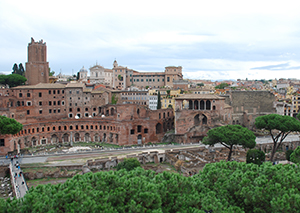HH 3000 Rome: City, Culture, History
Module organisers: Dr Laura Cleaver, Dr David Ditchburn & Dr Hazel Dodge
Duration: Jan-Apr
Contact Hours: 2 hrs p/w, including both lectures and seminars
Weighting: 10 ECTS
Assessment: 20% Continuous Assessment; 80% Examination
This module explores the urban history of one of the major European cities in both the ancient world and the Middle Ages: Rome, from its earliest development in the early 1st millennium BC to the city's sack in 1527. It will explore the physical site of the city and changes over time, together with ideas about Rome. It will also address the impact of a range of social and political issues on the city. It will thus consider the infrastructure, peoples and power structures of the site. The lectures will provide an overview of major themes together with case studies of particular examples. Specific primary material will be examined in seminars. This is an interdisciplinary course, taking as its starting point the methodology of urban history, but will require engagement with historical, archaeological and art historical evidence in conjunction with each other.

Learning Outcomes
On successful completion of this module students should be able to:
- Outline and explain different aspects of the history of ancient and medieval Rome
- Identify and search for relevant secondary literature
- Engage with relevant theoretical and critical approaches to the history of Rome in this period
- Apply different techniques of evaluation and interpretation to relevant primary sources
- Critique relevant historiography in the light of study of primary sources
- Present and discuss analysis of questions relating to the history of Rome
- Analyse the impact on Rome of different political, social, artistic and economic developments during the period.

